人教版七年级下册英语书
- 格式:pdf
- 大小:44.90 KB
- 文档页数:7
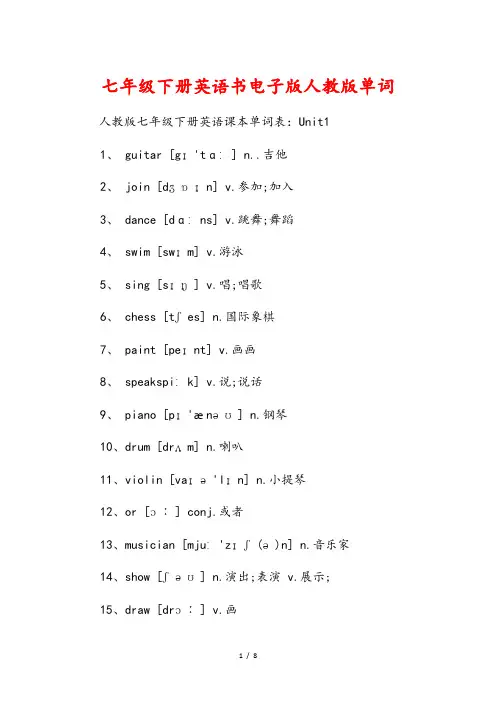
七年级下册英语书电子版人教版单词人教版七年级下册英语课本单词表:Unit11、 guitar [gɪ'tɑː] n..吉他2、 join [dʒɒɪn] v.参加;加入3、 dance [dɑːns] v.跳舞;舞蹈4、 swim [swɪm] v.游泳5、 sing [sɪŋ] v.唱;唱歌6、 chess [tʃes] n.国际象棋7、 paint [peɪnt] v.画画8、 speakspiːk] v.说;说话9、 piano [pɪ'ænəʊ] n.钢琴10、drum [drʌm] n.喇叭11、violin [vaɪə'lɪn] n.小提琴12、or [ɔː] conj.或者13、musician [mjuː'zɪʃ(ə)n] n.音乐家14、show [ʃəʊ] n.演出;表演 v.展示;15、draw [drɔː] v.画16、story ['stɔːrɪ] n.故事;小说17、tell [tel] v. n.讲述;告诉18、write [raɪt] v.写作,写字19、talk [tɔːk] v. n.说话;谈话20、also ['ɔːlsəʊ] ad. v.也;而且21、people ['piːp(ə)l] n..人; 人们22、center['sentə] n(=cen.tre)中心,中央23、home [həʊm] n. 家,活动本部.ad. v..到家,在家24、today [tə'deɪ] ad. v.在今天25、make [meɪk] v.使或为;制造26、weekend. [wiːk'end] n.周末27、teach [tiːtʃ] v.教,讲授人教版七年级下册英语课本单词表:Unit 21、 usually ['juʒuəli] ad. v.通常2、 up [ʌp] ad. v. 向上3、 dressed ['dresɪd] adj.穿着衣服4、 forty ['fɔːtɪ] n.um四十5、 fifty ['fɪftɪ] n.um五十6、 never ['nevə] adv.从来;决不7、 early ['ɜːlɪ] adv.adj.早的8、 station ['steɪʃ(ə)n] n.电视台;车站9、 funny ['fʌnɪ] adj.奇怪的;滑稽好笑的10、exercise ['eksəsaɪz] v.n.锻炼;练习11、group [gruːp] n.组群12、shower ['ʃaʊə] n. v.淋浴;淋浴器(间)13、take a shower淋浴;洗澡14、o'clock (=of the clock) ad. v点钟(只用于正点)15、work [wɜːk] n.& v.工作16、brush [brʌʃ] v.刷17、teeth [tiːθ] n.(tooth的复数形式)牙齿18、job [dʒɒb] n.工作;零工;任务;职位19、best [best] adj.& ad. v.(good, well的比较级)最好的(地)20、half [hɑːf] 一半,半数21、past [pɑːst] 过去,往事22、quarter ['kwɔːtə] n.一刻钟; 四分之一23、homework ['həʊmwɜːk] n.家庭作业24、run [rʌn] v. 跑;奔25、walk [wɔːk] 行走;步行26、clean. [kliːn] v.打扫;弄干净;adj.干净的27、quickly ['kwɪklɪ] ad.v.很快的28、either ['aɪðə] ad. v.或者;也29、lot [lɒt] pron.. 大量;许多30、taste [teɪst] v.有…的味道;品尝n..味道;31、life [laɪf] n. 生活,生存人教版七年级下册英语课本单词表:Unit 31、 train [treɪn] 火车2、 bus 公交车3、 subway ['sʌbweɪ] 地铁4、ride[raɪd]v.骑n.旅rode. [rəʊd]ridden.['rɪdn.]5、 bike [baɪk] 自行车6、 sixty ['sɪkstɪ] 六十7、 seventy ['sev (ə)ntɪ] 七十8、 eighty ['eɪtɪ] 八十9、 ninety ['naɪntɪ] 九十10、hundred ['hʌndrəd] 一百11、far[fɑː] 很12、minute ['mɪnɪt] 分钟13、kilometer ['kɪlə,mitɚ]公里14、new [njuː] 新的15、every ['evrɪ] 每一个16、by [baɪ] 通过,被17、drive [draɪv] 开车18、live [lɪv] 活的,生动的19、stop [stɒp] 停止20、cross [krɔs] 交叉21、river ['rɪvə] 河,江22、many ['menɪ]许多23、village [' vɪlɪdʒ] 村庄,村民24、between [bɪ'twiːn] 介于…之间25、bridge [brɪdʒ] 桥26、boat [bəʊt] 小船27、ropeway ['rop,we] n. 索道空中缆索28、year [jɪə] n. 年;年度;岁29、afraid [ə'freɪd] 害怕;惧怕30、like [laɪk] 像;怎么样(介词)31、leave [liː v] 离开;left (lea ve的过去式)32、dream [driːm] 梦想;睡梦33、true[truː] 真的;符合实际的人教版七年级下册英语课本单词表:Unit 41、 rule[ruːl] 规则;规章2、 arrive [ə'raɪv] 到达3、 hallway ['hɔːlweɪ] 走廊;过道4、 hall [hɔːl]大万礼堂5、 listen ['lɪs(ə)n]听;倾听6、 fight [faɪt] 打架;战斗7、 sorry ['sɒrɪ]抱歉的;难过的;惋惜的8、 outside [aʊt'saɪd] ad. v.在外面adj.外面的9、 wear [weə] 穿;戴10、important [ɪm'pɔːt(ə)nt] 重要的11、bring [brɪŋ] 带来;取来12、player ['pleɪə]播放机;运动员13、uniform ['juːnɪfɔːm] 校服;制服14、quiet ['kwaɪət] 安静的15、out [aʊt] 外出16、dish [dɪʃ] 碟;盘dishes17、night [naɪt] 晚上18、before [bɪ'fɔː]prep.conj在…以前ad v.以前19、dirty ['dɜːtɪ] 脏的20、kitchen ['kɪtʃɪn] 厨房21、more [mɔː] 更多的22、noisy ['nɒɪzɪ] 吵闹的23、relax [rɪ'læks] 放松;休息24、read [riːd] 读;阅读25、terrible['terɪb(ə)l] 非常讨厌的;可怕的26、feel [fiːl] 感受;觉的27、strict [strɪkt] 严格的;严厉的28、remember [rɪ'membə] 记住; 记起29、follow ['fɒləʊ] 遵循;跟随30、luck [lʌk] 幸运;运气31、keep [kiːp] 保持;保留32、hair [heə] 头发;毛发33、learn [lɜːn] 学习;学会。

七年级下册英语书第五课课文翻译人教版
你好。
我们是来自泰国的学生,并且我们想要拯救大象。
大象是泰国的象征之一。
我们的第一面国旗上有一头白色的大象。
这是一个好运的象征。
大象是聪明的动物,它们能踢足球或弹奏音乐。
它们画画也能画得很好。
人们说“大象从不遗忘东西”。
大象能走很长时间且从不迷路。
它们也能记住有食物和水的地方。
这帮助它们得以生存。
但是大象处于极大的危险中。
人们砍倒了许多的树因此大象渐渐失去它们的家园。
人们为了它们的象牙也杀死大象。
现在仅有太约3000头大象(之前超过10万头)。
我们必须拯救树木并且不要买由象牙制成的东西。
记住3月13日是泰国的大象日。
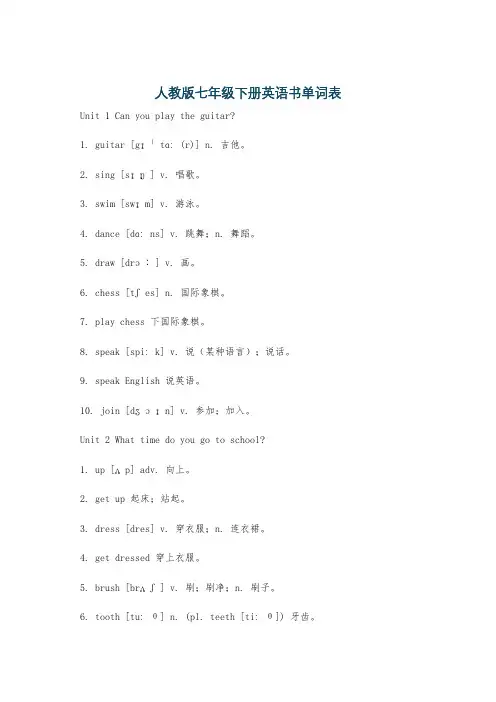
人教版七年级下册英语书单词表Unit 1 Can you play the guitar?1. guitar [gɪˈtɑː(r)] n. 吉他。
2. sing [sɪŋ] v. 唱歌。
3. swim [swɪm] v. 游泳。
4. dance [dɑːns] v. 跳舞;n. 舞蹈。
5. draw [drɔː] v. 画。
6. chess [tʃes] n. 国际象棋。
7. play chess 下国际象棋。
8. speak [spiːk] v. 说(某种语言);说话。
9. speak English 说英语。
10. join [dʒɔɪn] v. 参加;加入。
Unit 2 What time do you go to school?1. up [ʌp] adv. 向上。
2. get up 起床;站起。
3. dress [dres] v. 穿衣服;n. 连衣裙。
4. get dressed 穿上衣服。
5. brush [brʌʃ] v. 刷;刷净;n. 刷子。
6. tooth [tuːθ] n. (pl. teeth [tiːθ]) 牙齿。
7. brush one's teeth 刷牙。
8. shower [ˈʃaʊə(r)] n. & v. 淋浴;n. 淋浴器(间)9. take a shower 洗淋浴。
10. usually [ˈjuːʒuəli] adv. 通常地;一般地。
Unit 3 How do you get to school?1. train [treɪn] n. 火车。
2. bus [bʌs] n. 公共汽车。
3. subway [ˈsʌbweɪ] n. 地铁。
4. take the subway 乘地铁。
5. ride [raɪd] v. 骑;n. 旅程。
6. bike [baɪk] n. 自行车。
7. ride a bike 骑自行车。
8. sixty [ˈsɪksti] num. 六十。
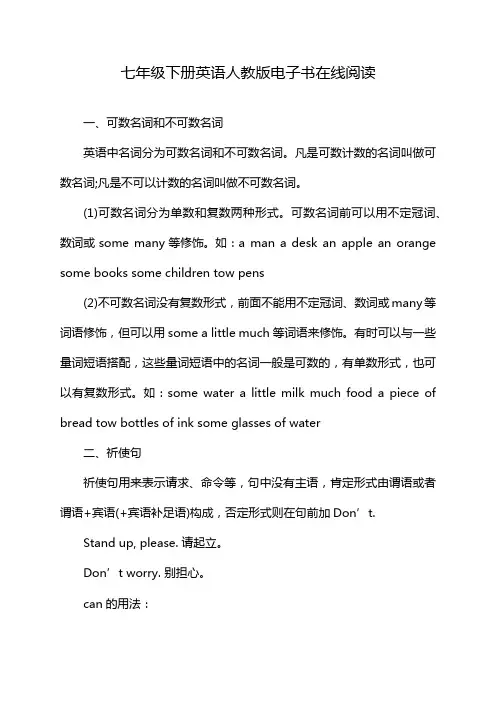
七年级下册英语人教版电子书在线阅读一、可数名词和不可数名词英语中名词分为可数名词和不可数名词。
凡是可数计数的名词叫做可数名词;凡是不可以计数的名词叫做不可数名词。
(1)可数名词分为单数和复数两种形式。
可数名词前可以用不定冠词、数词或some many等修饰。
如:a man a desk an apple an orange some books some children tow pens(2)不可数名词没有复数形式,前面不能用不定冠词、数词或many等词语修饰,但可以用some a little much等词语来修饰。
有时可以与一些量词短语搭配,这些量词短语中的名词一般是可数的,有单数形式,也可以有复数形式。
如:some water a little milk much food a piece of bread tow bottles of ink some glasses of water二、祈使句祈使句用来表示请求、命令等,句中没有主语,肯定形式由谓语或者谓语+宾语(+宾语补足语)构成,否定形式则在句前加Don’t.Stand up, please. 请起立。
Don’t worry. 别担心。
can的用法:can是情态动词,表示“能,会,可以,被允许等”,其后接动词原形,否定形式为cannot,可缩写为can’t.She can speak Japanese. 她会讲日语。
I can’t remember his name. 我不记得他的名字了。
Can you spell your name? 你会拼写你的'名字吗?初一下英语必备知识点:1、be动词(is,am,are)我(I)用am, 你(you)用are,is跟着他(he),她(she),它(it)。
单数名词用is,复数名词全用are。
变否定,更容易,be后not加上去。
变疑问,往前提,句末问号莫丢弃。
还有一条须注意,句首大写莫忘记。
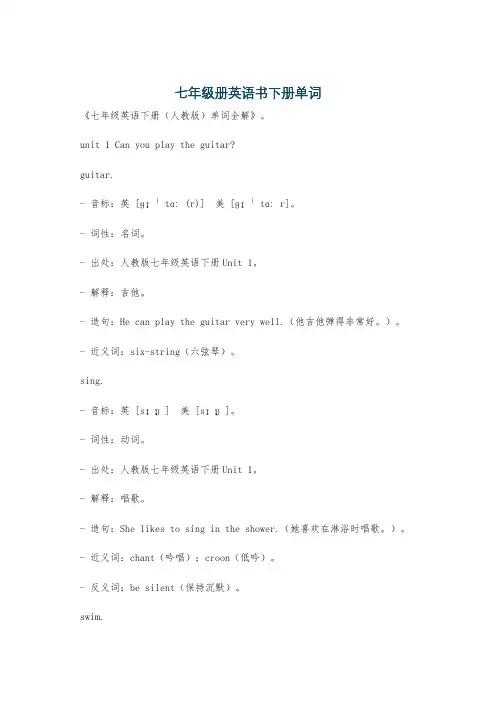
七年级册英语书下册单词《七年级英语下册(人教版)单词全解》。
unit 1 Can you play the guitar?guitar.- 音标:英 [ɡɪˈtɑː(r)] 美 [ɡɪˈtɑːr]。
- 词性:名词。
- 出处:人教版七年级英语下册Unit 1。
- 解释:吉他。
- 造句:He can play the guitar very well.(他吉他弹得非常好。
)。
- 近义词:six-string(六弦琴)。
sing.- 音标:英 [sɪŋ] 美 [sɪŋ]。
- 词性:动词。
- 出处:人教版七年级英语下册Unit 1。
- 解释:唱歌。
- 造句:She likes to sing in the shower.(她喜欢在淋浴时唱歌。
)。
- 近义词:chant(吟唱);croon(低吟)。
- 反义词:be silent(保持沉默)。
swim.- 音标:英 [swɪm] 美 [swɪm]。
- 词性:动词。
- 出处:人教版七年级英语下册Unit 1。
- 解释:游泳。
- 造句:I often swim in the river in summer.(夏天我经常在河里游泳。
)。
- 近义词:bathe(游泳,沐浴)。
- 反义词:sink(下沉)。
dance.- 音标:英 [dɑːns] 美 [dæns]。
- 词性:动词;名词。
- 出处:人教版七年级英语下册Unit 1。
- 解释:动词:跳舞;名词:舞蹈。
- 造句:- 动词:They often dance at parties.(他们经常在聚会上跳舞。
)。
- 名词:She is learning a new dance.(她正在学习一种新舞蹈。
)。
- 近义词:trip the light fantastic(跳舞)。
- 反义词:stand still(静止不动)。
draw.- 音标:英 [drɔː] 美 [drɔː]。
- 词性:动词。
- 出处:人教版七年级英语下册Unit 1。
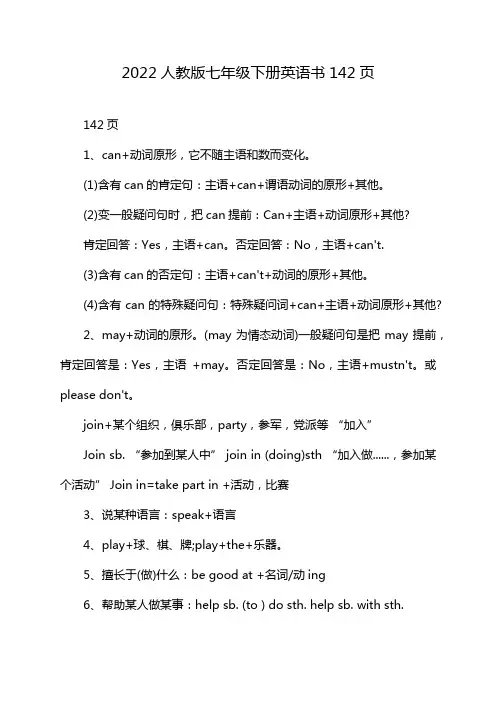
2022人教版七年级下册英语书142页142页1、can+动词原形,它不随主语和数而变化。
(1)含有can的肯定句:主语+can+谓语动词的原形+其他。
(2)变一般疑问句时,把can提前:Can+主语+动词原形+其他?肯定回答:Yes,主语+can。
否定回答:No,主语+can't.(3)含有can的否定句:主语+can't+动词的原形+其他。
(4)含有can的特殊疑问句:特殊疑问词+can+主语+动词原形+其他?2、may+动词的原形。
(may为情态动词)一般疑问句是把may提前,肯定回答是:Yes,主语+may。
否定回答是:No,主语+mustn't。
或please don't。
join+某个组织,俱乐部,party,参军,党派等“加入”Join sb. “参加到某人中” join in (doing)sth “加入做......,参加某个活动” Join in=take part in +活动,比赛3、说某种语言:speak+语言4、play+球、棋、牌;play+the+乐器。
5、擅长于(做)什么:be good at +名词/动ing6、帮助某人做某事:help sb. (to ) do sth. help sb. with sth.7、我能知道你名字吗?May I know your name?8、想要做什么:want to do sth 例如:I want to learn about art.9、What club do you want to join?I want to join the chess club and the basketball club.10、What club does Tom want to join? He wants to join the swimming club .11、He can’t play the violin or the piano. Can you help kids with swimming?12、Why do you want to join the English club? Because I want to learn English well.。

七年级下册1 – 12单元(课文+翻译)Unit 1 Can you play the guitar? ------------------------------------------ P 2你会弹吉他吗?Unit 2 What time do you go to school? --------------------------------- P 3你几点上学?Unit 3 How do you get to school? ---------------------------------------- P 5你怎样到达学校?Unit 4 Don’t eat in class. --------------------------------------------------- P 6上课不要吃东西。
Unit 5 Why do you like pandas? ----------------------------------------- P 8你为什么喜欢熊猫?Unit 6 I’m watching TV. -------------------------------------------------- P 10我正在看电视。
Unit 7 It’s raining! --------------------------------------------------------- P 11正在下雨!Unit 8 Is there a post office near here? -------------------------------- P 13这附近有邮局吗?Unit 9 What does he look like? ------------------------------------------ P 15他长什么样?Unit 10 I’d like some noodles. -------------------------------------------- P 16我想要些面条。
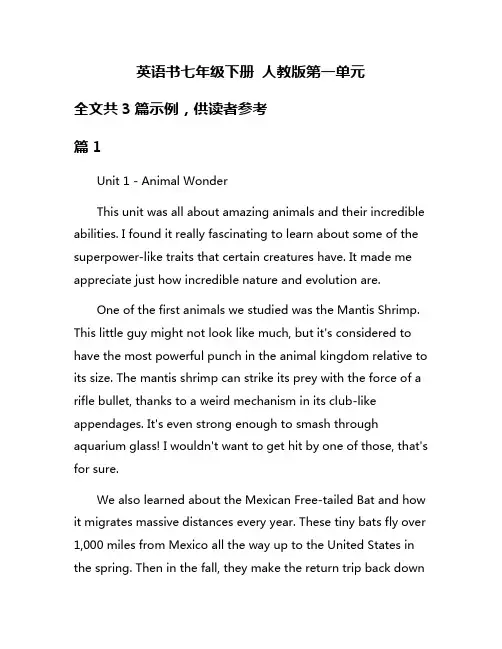
英语书七年级下册人教版第一单元全文共3篇示例,供读者参考篇1Unit 1 - Animal WonderThis unit was all about amazing animals and their incredible abilities. I found it really fascinating to learn about some of the superpower-like traits that certain creatures have. It made me appreciate just how incredible nature and evolution are.One of the first animals we studied was the Mantis Shrimp. This little guy might not look like much, but it's considered to have the most powerful punch in the animal kingdom relative to its size. The mantis shrimp can strike its prey with the force of a rifle bullet, thanks to a weird mechanism in its club-like appendages. It's even strong enough to smash through aquarium glass! I wouldn't want to get hit by one of those, that's for sure.We also learned about the Mexican Free-tailed Bat and how it migrates massive distances every year. These tiny bats fly over 1,000 miles from Mexico all the way up to the United States in the spring. Then in the fall, they make the return trip back downsouth. Can you imagine flying that far when you only weigh around 0.4 ounces? Their endurance is just mind-blowing. Humans struggle with marathons but these bats are flyingultra-marathons twice a year!Another cool animal was the Electric Eel. Despite the name, it's not actually an eel at all - it's a type of knifefish. But what makes it so special is its ability to generate powerful electric shocks. An adult electric eel can produce around 600 volts, which is more than enough to knock a person unconscious! They use these shocks to stun prey and also for self-defense. I definitely wouldn't want to go swimming with these guys.However, my personal favorite section was on the Leaf-tailed Gecko. These lizards are just masters of camouflage. Their tails are broad and flat, with patterns that make them look exactly like dead leaves. They can even hang motionless, pretending to be leaves blowing in the wind. It's such an effective disguise that predators have an extremely hard time spotting them. I loved seeing the pictures of these geckos - they blend into their surroundings perfectly. Nature's own little masters of disguise!Speaking of camouflage, we also studied the incredible Mimic Octopus. This octopus species can contort its body to impersonate over 15 different species! It can mimic shrimp,lionfish, starfish, sea snakes, and even other octopuses. The mimic octopus does this for both hunting and defensive reasons. It's just amazing to me that the octopus can transform its shape and movements so precisely to fool other animals. It's like an undersea master of deception and disguise.There were lots of other fascinating creatures too, like the Wood Frog that can actually freeze solid during winter and thaw out alive in spring. Or the Purple Basilisk that can literally run across the surface of water to escape predators. Every time I thought I'd learned about the most unbelievable superpower, we studied another mind-blowing species.What I loved most about this unit is that it really highlighted how every living thing on our planet has evolved some incredible mechanism or behavior to survive. From the mantis shrimp's powerful smash to the gecko's camouflage to the basilisk's water-running skills, nature has equipped all sorts of creatures with their own "superpowers." It makes me appreciate the complexity and beauty of the natural world even more.I also enjoyed learning about these marvels of nature through the readings, videos, and activities in class. The textbook had really vibrant images and engaging descriptions that brought these animals to life. And our teacher made the lessonsinteractive with things like mimicking the motions of the mimic octopus or having us pretend to be camouflaged geckos. It was a fun way to immerse ourselves in learning about such peculiar yet remarkable species.Overall, I'd say Unit 1 on "Animal Wonder" was definitely one of my favorite units so far this year. I gained a whole new admiration for the amazing diversity of life on our planet and the incredible evolutionary traits that animals have developed. This unit opened my eyes to some of nature's most bizarre yet awesome "superpowers." I can't wait to see what other marvels we'll explore next!篇2Unit 1: A Balanced DietThis unit was all about healthy eating and having a balanced diet. As a 7th grader, I found it really interesting to learn more about nutrition and why it's so important to eat a variety of foods.The first text was a really cool article called "The Nutrients We Need." It explained that there are six main nutrient groups that our bodies need: carbohydrates, proteins, fats, vitamins,minerals, and water. Each one has an important role to play in keeping us healthy and energized.Carbohydrates are our main source of energy and come from foods like grains, fruits, and veggies. Proteins help build and repair body tissues and can be found in things like meat, eggs, beans, and dairy products. Fats insulate our bodies and allow us to absorb certain vitamins - but we only need a small amount of healthy fats each day.The article also taught me about all the different vitamins and minerals we require from our diets. Vitamins like A, C, and D keep our vision sharp, skin glowing, and bones strong. Minerals like calcium, iron, and zinc help with muscle function, producing red blood cells, and a strong immune system. And of course, water is absolutely vital for every part of our body to function properly.After learning about these crucial nutrient groups, the next section focused on what makes up a balanced diet. The key is eating a variety of foods from each group in the right proportions. The USDA's MyPlate model shows that we should make half our plate fruits and veggies, with the other half split between whole grains and lean protein, plus a small side of dairy.It really helped me visualize what a healthy, balanced meal looks like.One part I found most interesting was learning about the consequences of an unbalanced diet containing too much or too little of certain nutrients. Things like obesity, diabetes, hypertension, and malnutrition can all stem from unhealthy eating patterns over time. It motivated me to be more mindful of my food choices.In the listening and speaking sections, we practiced describing people's dietary habits and preferences. We roleplayed ordering healthy meals at restaurants, and advising friends or family members on improving their diets. It was a great way to apply what we had learned about balanced nutrition.The reading passages introduced some fascinating examples of unique diets around the world. I loved learning about the Mediterranean diet rich in olive oil, legumes, and fish. And the vegetarian diets common in parts of India sounded so flavorful with all the spices, lentils, and fresh produce.It made me appreciate how diets can be influenced by geography, religion, culture, and even climate. Humans have adapted to survive on all sorts of locally available foodsthroughout history. Yet the principles of a balanced diet remain universal across the globe.There was also a touching personal narrative by a teenager struggling with an eating disorder. It really drove home how obsessing over body image and drastically restricting certain foods can be extremely unhealthy, both physically and mentally. Having a positive relationship with food and eating a balanced variety is so important at our age.The writing activities had us summarizing the key points about the six nutrient groups, interpreting food labels and nutrition facts, and constructing persuasive arguments for adopting balanced diets. I enjoy writing, so I had fun synthesizing everything I had learned into cohesive paragraphs and essays.Overall, this unit opened my eyes to the importance of balanced nutrition for living an active, healthy lifestyle as a growing teenager. I'm much more aware now of getting proper servings from each food group. And I have a deeper appreciation for the amazing diversity of cultural diets across the world.My favorite part was planning our own healthy meal project at the end. We had to design a full day's balanced menu including breakfast, lunch, dinner, and snacks. It was tricky at first,ensuring the right nutrient proportions. But after reviewing the guidelines from class, I came up with a deliciousMexican-inspired menu that I'm really proud of:For breakfast, I chose a breakfast burrito with scrambled eggs, black beans, brown rice, avocado slices, and salsa on a whole wheat tortilla. With a glass of calcium-fortified orange juice, it covers my protein, complex carbs, healthy fat, vitamins, and dairy for the morning.As a mid-morning snack, I'd have an apple with a handful of almonds and dried cranberries. This provides fiber, antioxidants, and a nice mix of sweet and savory flavors.For lunch, my main dish is a grilled chicken breast over a southwestern salad with romaine lettuce, corn, black beans, diced tomatoes, sliced avocado, and a citrus vinaigrette dressing. On the side, some fresh guacamole with baked tortilla chips. This balanced plate gives me lean protein, a bounty of veggies and fruits, fiber, and healthy unsaturated fats.In the afternoon, a Greek yogurt parfait with berries, honey, and granola would be the perfect light, nutrient-dense snack to re-energize me.Then for dinner, I designed a Mexican-inspired grain bowl. It features cilantro-lime quinoa, blackened shrimp, sautéed fajita veggies like bell peppers and onions, fresh pico de gallo salsa, and a dollop of non-fat plain Greek yogurt. With complex carbs, protein, a rainbow of produce, and a probiotic-rich topping, it's a fiesta of flavor and nutrition!To finish off the day, a creamy mango smoothie blended with banana, spinach, Greek yogurt, and a sprinkle of chia and flax seeds. It's like a healthy milkshake packed with vitamins, minerals, fiber, protein and antioxidants.I think this menu proves you can absolutely maintain a balanced, nutrient-rich diet without feeling deprived. There are so many delicious ways to enjoy all the food groups in moderation. Now that I understand how essential proper nutrition is for my growth and development, I'm motivated to continue making balanced diet choices every day.篇3Unit 1: A Balanced DietEating a balanced diet is super important for our health and growth, especially for us students who are still developing physically and mentally. This unit really opened my eyes to theimportance of good nutrition and gave me a lot of useful knowledge.The first text was a fun story called "The Lunchbox Tradition". It was about a Chinese-American boy named Tim who felt embarrassed by the traditional Chinese lunches his mom packed for him. At first, he just wanted a sandwich like the other kids. But then he realized how lucky he was to have such delicious and healthy home-cooked meals. His friend's greasy pizza and burger looked a lot less appealing! The story taught me to appreciate my cultural traditions and not be influenced by peer pressure.Then we learned about the different food groups and nutrients our bodies need. Carbohydrates give us energy, proteins help build muscle, vitamins keep us healthy, and so on. Understanding these nutrition basics will help me make smarter food choices. The food pyramid visuals were really helpful too.My favorite part was the reading about diet cultures around the world. I found it fascinating how eating habits can vary so much based on geography, climate, traditions and beliefs. For example, the Inuit people of the Arctic survive almost entirely on meat and fish since plants can't grow in that freezing environment. On the other hand, Buddhist monks have acompletely vegetarian diet. Such extreme diets wouldn't work for most people, but they make sense in context. It made me appreciate the diversity of our world.The unit also discussed contemporary issues like food wastage, unhealthy eating trends, and the environmental impact of our diets. These are complex global problems with no easy solutions, but raising awareness is the first step. As future adults, it's our responsibility to make sustainable choices.Personally, my biggest takeaway was the importance of portion control and eating in moderation. I have a major weakness for junk food like chips, candy and soda. This unit made me realize how unhealthy and fattening those empty calories are. From now on, I'll try to limit them as treats and eat more fruits, veggies, whole grains and lean protein instead. Healthy bodies AND healthy minds - that's the goal!Overall, I'm glad we covered such an essential life topic this semester. The readings and activities have helped shape my understanding of nutrition and dietary habits. I feel much more equipped now to develop balanced eating patterns that will serve me well in the long run. A big thanks to our English teachers for designing such an informative and engaging unit!。
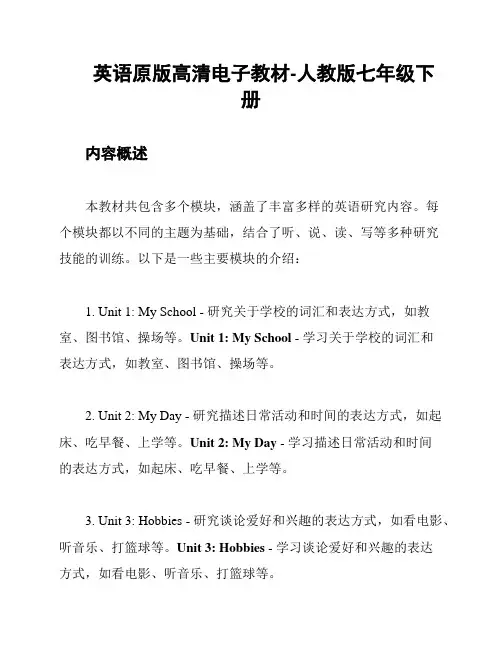
英语原版高清电子教材-人教版七年级下册内容概述本教材共包含多个模块,涵盖了丰富多样的英语研究内容。
每个模块都以不同的主题为基础,结合了听、说、读、写等多种研究技能的训练。
以下是一些主要模块的介绍:1. Unit 1: My School - 研究关于学校的词汇和表达方式,如教室、图书馆、操场等。
Unit 1: My School - 学习关于学校的词汇和表达方式,如教室、图书馆、操场等。
2. Unit 2: My Day - 研究描述日常活动和时间的表达方式,如起床、吃早餐、上学等。
Unit 2: My Day - 学习描述日常活动和时间的表达方式,如起床、吃早餐、上学等。
3. Unit 3: Hobbies - 研究谈论爱好和兴趣的表达方式,如看电影、听音乐、打篮球等。
Unit 3: Hobbies - 学习谈论爱好和兴趣的表达方式,如看电影、听音乐、打篮球等。
4. Unit 4: Our Country - 研究关于国家和国籍的词汇,以及描述地理位置的表达方式。
Unit 4: Our Country - 学习关于国家和国籍的词汇,以及描述地理位置的表达方式。
5. Unit 5: Food and Health - 研究关于食物和健康的词汇,以及描述喜好和建议的表达方式。
Unit 5: Food and Health - 学习关于食物和健康的词汇,以及描述喜好和建议的表达方式。
6. Unit 6: Festivals - 研究关于节日和庆祝活动的词汇,如春节、圣诞节、生日等。
Unit 6: Festivals - 学习关于节日和庆祝活动的词汇,如春节、圣诞节、生日等。
特点和优势1. 高清电子教材 - 本教材提供高清的电子版,便于学生在电脑或平板设备上阅读和研究。
高清电子教材 - 本教材提供高清的电子版,便于学生在电脑或平板设备上阅读和学习。
2. 丰富多样的研究内容 - 每个模块都涵盖了不同主题的研究内容,帮助学生扩展词汇量和语言运用能力。
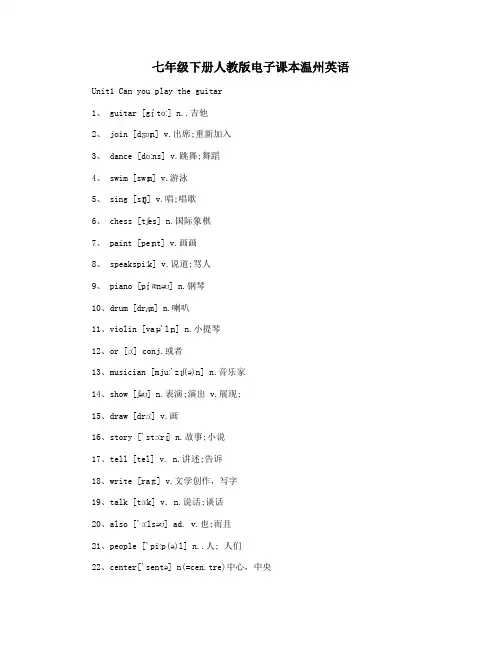
七年级下册人教版电子课本温州英语 Unit1 Can you play the guitar1、 guitar [gɪ'tɑː] n..吉他2、 join [dʒɒɪn] v.出席;重新加入3、 dance [dɑːns] v.跳舞;舞蹈4、 swim [swɪm] v.游泳5、 sing [sɪŋ] v.唱;唱歌6、 chess [tʃes] n.国际象棋7、 paint [peɪnt] v.画画8、 speakspiːk] v.说道;骂人9、 piano [pɪ'ænəʊ] n.钢琴10、drum [drʌm] n.喇叭11、violin [vaɪə'lɪn] n.小提琴12、or [ɔː] conj.或者13、musician [mjuː'zɪʃ(ə)n] n.音乐家14、show [ʃəʊ] n.表演;演出 v.展现;15、draw [drɔː] v.画16、story ['stɔːrɪ] n.故事;小说17、tell [tel] v. n.讲述;告诉18、write [raɪt] v.文学创作,写字19、talk [tɔːk] v. n.说话;谈话20、also ['ɔːlsəʊ] ad. v.也;而且21、people ['piːp(ə)l] n..人; 人们22、center['sentə] n(=cen.tre)中心,中央23、home [həʊm] n. 家,活动本部.ad. v..到家,在家24、today [tə'deɪ] ad. v.在今天25、make [meɪk] v.并使或为;生产26、weekend. [wiːk'end] n.周末27、teach [tiːtʃ] v.教,讲授Unit 2 What time do you go to school1、 usually ['juʒuəli] ad. v.通常2、 up [ʌp] ad. v. 向上3、 dressed ['dresɪd] adj.穿著衣服4、 forty ['fɔːtɪ] n.um四十5、 fifty ['fɪftɪ] n.um五十6、 never ['nevə] adv.从来;决不7、 early ['ɜːlɪ] adv.adj.晚的8、 station ['steɪʃ(ə)n] n.电视台;车站9、 funny ['fʌnɪ] adj.怪异的;搞笑可笑的10、exercise ['eksəsaɪz] v.n.锻炼;练习11、group [gruːp] n.组群12、shower ['ʃaʊə] n. v.淋浴;淋浴器(间)13、take a shower淋浴;泡澡14、o'clock (=of the clock) ad. v点钟(只用于正点)15、work [wɜːk] n.& v.工作16、brush [brʌʃ] v.刷17、teeth [tiːθ] n.(tooth的复数形式)牙齿18、job [dʒɒb] n.工作;零工;任务;职位19、best [best] adj.& ad. v.(good, well的比较级)最出色的(地)20、half [hɑːf] 一半,半数21、past [pɑːst] 过去,追忆22、quarter ['kwɔːtə] n.一刻钟; 四分之一23、homework ['həʊmwɜːk] n.家庭作业24、run [rʌn] v. 跑;奔25、walk [wɔːk] 奔跑;步行26、clean. [kliːn] v.打扫;弄干净;adj.干净的27、quickly ['kwɪklɪ] ad.v.很快的28、either ['aɪðə] ad. v.或者;也29、lot [lɒt] pron.. 大量;许多30、taste [teɪst] v.有…的味道;品尝n..味道;31、life [laɪf] n. 生活,存活Unit 3 How do you get to school1、 train [treɪn] 火车2、 bus 公交车3、 subway ['sʌbweɪ] 地铁4、ride[raɪd]v.骑n.旅rode. [rəʊd]ridden.['rɪdn.]5、 bike [baɪk] 自行车6、 sixty ['sɪkstɪ] 六十7、 seventy ['sev (ə)ntɪ] 七十8、 eighty ['eɪtɪ] 八十9、 ninety ['naɪntɪ] 九十10、hundred ['hʌndrəd] 一百11、far[fɑː] 很12、minute ['mɪnɪt] 分钟13、kilometer ['kɪlə,mitɚ]公里14、new [njuː] 新的15、every ['evrɪ] 每一个16、by [baɪ] 通过,被17、drive [draɪv] 驾车18、live [lɪv] 活的,生动的19、stop [stɒp] 暂停20、cross [krɔs] 交叉21、river ['rɪvə] 河,江22、many ['menɪ]许多23、village [' vɪlɪdʒ] 村庄,村民24、between [bɪ'twiːn] 介于…之间25、bridge [brɪdʒ] 桥26、boat [bəʊt] 小船27、ropeway ['rop,we] n. 索道空中缆索28、year [jɪə] n. 年;年度;岁29、afraid [ə'freɪd] 惧怕;畏惧30、like [laɪk] 像;怎么样(介词)31、leave [liː v] 返回;left (lea ve的过去式)32、dream [driːm] 梦想;睡梦33、true[truː] 真的;符合实际的Unit 4 Don’t eat in class1、 rule[ruːl] 规则;规章2、 arrive [ə'raɪv] 到达3、 hallway ['hɔːlweɪ] 走廊;过道4、 hall [hɔːl]大万礼堂5、 listen ['lɪs(ə)n]听到;聆听6、 fight [faɪt] 打架;战斗7、 sorry ['sɒrɪ]对不起的;伤心的;遗憾的8、 outside [aʊt'saɪd] ad. v.在外面adj.外面的9、 wear [weə] 穿;穿10、important [ɪm'pɔːt(ə)nt] 重要的11、bring [brɪŋ] 增添;挑去12、player ['pleɪə]播放机;运动员13、uniform ['juːnɪfɔːm] 校服;军服14、quiet ['kwaɪət] 安静的15、out [aʊt] 出外16、dish [dɪʃ] 碟;盘dishes17、night [naɪt] 晚上18、before [bɪ'fɔː]prep.conj在…以前ad v.以前19、dirty ['dɜːtɪ] 干净的20、kitchen ['kɪtʃɪn] 厨房21、more [mɔː] 更多的22、noisy ['nɒɪzɪ] 吵闹的23、relax [rɪ'læks] 收紧;歇息24、read [riːd] 读;阅读25、terrible['terɪb(ə)l] 非常喜欢的;可以害怕的26、feel [fiːl] 感受;觉的27、strict [strɪkt] 严苛的;严苛的28、remember [rɪ'membə] 记住; 记起29、follow ['fɒləʊ] 遵从;追随30、luck [lʌk] 幸运;运气31、keep [kiːp] 维持;留存32、hair [heə] 头发;毛发33、learn [lɜːn] 自学;学会Unit 5 What do you like pandas1、 tiger ['taɪgə] n.老虎2、 elephan.t ['elɪf(ə)n.t] n. 大象3、 koala [kəʊ'ɑːlə] n. 树袋熊4、panda ['pændə] n. 熊猫5、 lion ['laɪən] n.狮子6、 giraffe [dʒə'rɑ:f] n. 长颈鹿7、 cute [kjuːt] adj调皮的;机灵的8、 lazy ['leɪzɪ] 懒散的;懒惰的9、 smart [smɑːt] adj 精明的10、beautiful ['bjuːtɪfʊl] adj 美丽的;美好的11、scary ['skeərɪ] adj厉害的;血腥的12、kind [kaɪn.d] n. 种类13、Australia [ɒ'streɪlɪə] n. 澳大利亚14、south [saʊθ] adj 南方的n. 南; 南方15、Africa ['æfrɪkə] n.非洲16、pet [pet] n. 宠物17、leg [leg] n. 腿18、cat [kæt] n. 猫19、sleep [sliːp] n.睡20、animal ['ænɪm(ə)l] n. 动物21、friendly ['fren(d)lɪ] adj 亲善的22、shy [ʃaɪ] adj 羞怯的;腼腆的23、save [seɪv] v. 救回;救助24、symbol ['sɪmb(ə)l] n.象征25、flag [flæg]n. 旗;旗帜26、forget [fə'get] v.忘记;旗杆27、place [pleɪs] n. 地点;边线28、water ['wɔːtə] n.水29、danger ['deɪn(d)ʒə] n. 危险30、cut [kʌt] v. 砍;切31、down [daʊn] ad. v.(挤摔倒)下32、tree [triː] n. 树33、kill [kɪl] v.杀掉;掐死34、ivory ['aɪv(ə)rɪ] n.象牙35、over ['əʊvə] prep. 少于;多于在… 上方36、zoo [zuː] n.动物园Unit6 I’m watching TV1、 newspaper ['n.juːzpeɪpə] n.报纸2、 use [juːz] v.采用;运用3、 soup [suːp] n.汤4、 wash [wɒʃ] v.洗脸5、 movie ['muːvɪ] n.电影6、 just [dʒʌst] adv. 只是;恰好7、 house [haʊs] n.房子8、 drin.k [drɪŋk] v.喝 n..饮料9、 tea [tiː] n.茶;茶叶10、tomorrow [tə'mɒrəʊ] ad. v.在明天11、pool [puːl] n.(复数pools) 游泳池12、shop [ʃɒp] v.购物13、supermarket ['suːpəmɑːkɪt] n. 超市14、man [mæn] n.男人;人15、host [həʊst] n.主人;东道主16、study ['stʌdɪ] v. n.自学;研究17、state [steɪt] n. 洲18、the United States [ði juˈnaɪtɪd stets]美国;美利坚合众国19、American adj美国的;美洲的n.美国人;美洲人20、dragon ['dræg(ə)n] n.龙21、young [jʌŋ] 幼小的,年长的22、race [reɪs] 竞赛23、any ['enɪ] 任何一个.任一的24、other ['ʌðə] adj另外的25、children ['tʃɪldrən] n. 儿童26、miss [mɪs] 怀念.思念27、wish [wɪʃ] v. 期望28、delicious [dɪ'lɪʃəs] adj 可口的.美味的29、still [stɪl] ad. v. 还.仍然30、living room ['lɪvɪŋ ru:m] 客厅Unit 7 It's raining!1、 rain [reɪn] 下雨;雨水2、 windy ['wɪndɪ] 多风的3、 cloudy ['klaʊdɪ] 多云的4、 sunny ['sʌnɪ] 阳光明媚的5、 snow [snəʊ]下雪;雪Snow6、weather ['weðə] 天气7、 cook [kʊk] 做饭8、bad [bæd] 糟的;坏的9、 park [pɑːk] 公园10、message ['mesɪdʒ]信息;消息11、take a message捎个口信;传话12、him他(he的宾格)13、could[kʊd] 能;可以14、ba ck [bæk] 回去;回去原处15、call(sb)back回电话16、problem ['prɒbləm] 困难;难题17、again [ə'gen; ə'geɪn] 再一次;又一次18、dry [draɪ]潮湿的19、cold [kəʊld] 寒冷的;冷的20、hot [hɒt] 冷的21、warm [wɔːm] 温暖的22、visit ['vɪzɪt] 造访;参观23、Canada ['kænədə]加拿大24、summer ['sʌmə] 夏天;夏季25、sit [sɪt] 坐26、juice [dʒuːs] 果汁;饮料27、soon [suːn] 不久;很快28、vacation [və'keɪʃ(ə)n] 假期29、on (a) vacation 度假30、hard [hɑːd]不懈努力地;困难的31、Europe ['jʊrəp] 欧洲32、mountain ['maʊntɪn] 高山33、country ['kʌntrɪ] 国;国家34、skate [skeɪt] 滑冰35、snowy ['snəʊɪ] 下雪的36、winter ['wɪntə] 冬天;冬季37、Russian ['rʌʃ(ə)n]俄罗斯的;俄罗斯人;俄语38、snowman ['snəʊmæn]雪人39、rainy ['reɪnɪ] 阴雨的;多雨的40、Joe [dʒəʊ] 乔41、Jeff [dʒef] 杰夫42、Moscow ['mɔskəʊ] 莫斯科43、Toronto [tə'rɑnto] n. 多伦多44、Boston ['bɔstən] 波士顿Unit 8 Is there a post office n.ear here?1、 post [pəʊst] 邮政2、 office['ɒfɪs] 办公室3、 post office邮局4、 police [pə'liːs] 警察5、 police station ['steɪʃən] 警察局6、 hotel [həʊ'tel] 旅店;酒店7、 restaurant ['restrɒnt] 餐馆8、bank [bæŋk] 银行9、 hospital ['hɒspɪt(ə)l]医院10、street [striːt] 大街11、pay [peɪ] 下载12、payphone ['peifəun] 付费电话13、near[nɪə] 在……附近14、across [ə'krɒs] 过;穿过15、across from在……对面16、front [frʌnt] 前面17、in front of在……前面18、behind [bɪ'haɪnd] 在……后面19、town [taʊn]镇;市镇20、around [ə'raʊnd] 到处;大约21、north [nɔːθ] 北;北方;北方的22、along [ə'lɒŋ] 沿着23、go along沿着(这条街)跑24、turn [tɜːn]转向;翻25、right [raɪt] 向右边;右边26、left [left] 向左边;左边27、rurn right向右、左转28、crossing ['krɒsɪŋ] 十字路口29、neighborhood ['neɪbə,hʊd] 街区;街坊30、spend [spend] 花(时间、钱等)31、spend time花掉时间32、climb [klaɪm]爬33、road [rəʊd] 路34、often ['ɒf(tə)n] 时常;常常35、air [eə] 空气36、sun shine阳光37、free [friː]免费的38、enjoy [ɪn'dʒɒɪ] 享受;喜爱39、enjoy reading['riːdɪŋ] 讨厌写作40、easily ['iːzɪlɪ] 容易地41、money ['mʌnɪ] 钱Unit 9 What does he look like?1、 curly ['kɜːlɪ]卷曲的2、 straight [streɪt] 直的3、 tall [tɔːl] 低的4、 medium ['miːdɪəm] 中等的5、 height [haɪt] 体重;高度6、 of medium height中等身高7、thin [θɪn] 胖的8、 heavy ['hevɪ] 重的9、 build [bɪld] 身材10、of medium build中等身材11、tonight [tə'naɪt] 今夜12、little ['lɪt(ə)l] 小的13、a little一点,少量14、cinema['sɪnɪmə] 电影院15、glasses ['glɑːsɪz] 眼镜16、later ['leɪtə] 以后17、handsome ['hæns(ə)m] 英俊的18、actor ['æktə] 演员19、actress['æktrɪs] 女演员20、person ['pɜːs(ə)n]人21、nose [nəʊz] 鼻子22、blonde [blɒnd] adj. 金黄色的23、mouth [maʊθ] 嘴24、round [raʊnd]圆形的25、face [feɪs] 脸26、eye [aɪ] 眼睛27、singer ['sɪŋə(r)] 歌手28、artist ['ɑːtɪst] 艺术家29、crime [kraɪm] 犯罪活动30、criminal ['krɪmɪn(ə)l] 犯罪31、put [pʊt] 摆32、each [iːtʃ] 每个,各自33、way [weɪ] 方式,路线34、describe [dɪ'skraɪb] 描述35、differently ['dɪfərəntlɪ] 相同的36、another[ə'nʌðə] 另一,又一37、end [end] 结尾,尽头38、in the end最后39、real [riːl] 真正的40、jeans [dʒinz] 牛仔裤41、Johnny ['dʒɒnɪ] 约翰尼42、Dean [din] 迪安43、Tina ['tinə]蒂娜44、Jackson ['dʒæksn] 杰克逊Unit 10 I'd like some noodles1、 noodle ['nuːd(ə)l] 面条2、 mutton ['mʌt(ə)n] 羊肉3、 beef [biːf] 牛肉4、 cabbage [ˈkæbɪdʒ] 卷心菜;洋白菜5、 potato [pə'teɪtəʊ] 土豆;马铃薯6、 special ['speʃ(ə)l] 特色菜;特价品;特别的;特定的7、 would [wʊd; wəd] (表示意愿)愿意8、 would like愿;讨厌9、 yet(常用于否定句或疑问句)还;仍然10、large[lɑːdʒ]大号的;小的11、order ['ɔːdə] 点菜;命令12、take one's order点菜13、size [saɪz] 大小;尺码14、bowl[bəʊl] 碗15、one(large)bowl of一(大)碗16、tofu ['təʊfuː] 豆腐17、meat [miːt] (可食用的)肉18、dumpling ['dʌmplɪŋ] 饺子19、porridge ['pɒrɪdʒ] 粥;面糊20、onion ['ʌnjən] 洋葱21、fish [fɪʃ] 鱼;鱼肉22、pancake ['pænkeɪk]烙饼;薄饼23、world [wɜːld] 世界24、around [ə'raʊnd] the world世界各地25、answer ['ɑːnsə] 答案;回答26、different ['dɪf(ə)r(ə)nt]相同的27、cake [keɪk] 蛋糕28、candle ['kænd(ə)l] 蜡烛29、age [eɪdʒ] 年龄30、make a wish [wɪʃ] 赐福31、blow [bləʊ] 吹32、blow out点燃33、if如果34、will [wɪl] 可以35、the UK(等于the United Kingdom)英国35、candy ['kændɪ] 糖果37、lucky幸运的38、popular畅销的;广泛的39、get popular受欢迎;流行40、cut up磨碎41、idea [aɪ'dɪə] 想法;主意42、bring good luck[lʌk] to…给……增添好运Unit11 How was your school trip?1、 milk [mɪlk] 犁地2、 cow[kaʊ] n. 奶牛,母牛3、 milk a cow给奶牛犁地4、 horse [hɔːs] 马5、 ride [raɪd] a horse骑马6、 feed [fiːd] 喂养;饲养7、 feed chickens ['tʃɪkɪns] 外婆家8、 farmer ['fɑːmə] 农民;农场主9、 quite [kwaɪt] 相当;安全10、quite a lot(of…) 许多11、anything ['enɪθɪŋ] (常用于否定句或疑问句)任何东西;任何事物12、grow [grəʊ] 种植;生长;发育13、farm [fɑːm] 农场;种地;种田14、pick [pɪk] 采;摘15、excellent ['eks(ə)l(ə)nt]极好的;优秀的16、countryside ['kʌntrɪsaɪd] 乡村;农村17、in the countryside在乡下;在农村18、yesterday ['jestədeɪ; -dɪ] 昨天19、flower ['flaʊə] 花20、worry ['wʌrɪ] 害怕;忧虑21、luckily ['lʌkɪlɪ] 幸运地;好运地22、sun [sʌn] 太阳23、museum [mjuː'zɪəm] 博物馆24、fire ['faɪə] 火灾25、fire station ['steɪʃ(ə)n] 消防站26、painting ['peɪntɪŋ] 油画;绘画27、exciting [ɪk'saɪtɪŋ; ek-]并使人激动的;令人激动的28、lovely ['lʌvlɪ] 可爱的29、expensive [ɪk'spensɪv; ek-] 高昂的30、cheap[tʃiːp] 廉价的;便宜的31、slow [sləʊ] 缓慢的;迟缓的32、fast [fɑːst] 快地(的)33、robot ['rəʊbɒt] 机器人34、guide [gaɪd] 导游;向导35、gift [gɪft] 礼物;赠品36、all in all总的说来37、everything ['evrɪθɪŋ] 一切;所有事物38、interested ['ɪnt(ə)rɪstɪd] 感兴趣的39、be interested in对……感兴趣40、dark [dɑːk] 黑暗的;昏暗的41、hear(heard) [hɪə] 听见;听到42、Carol ['kær(ə)l] 卡罗尔Unit12 What did you do last weekend?1、camp [kæmp]扎营2、 lake [leɪk] 湖,湖泊3、 beach [biːtʃ] 海滩,沙滩4、badminton ['bædmɪnt(ə)n] 羽毛球运动5、 sheep [ʃiːp] 羊,绵羊6、as [æz; əz] 做为,当作7、natural['nætʃ(ə)r(ə)l] adj. 自然的8、 butterfly蝴蝶9、 tired [taɪəd] 疲倦的10、stay [steɪ] 逗留11、stay up late深夜不留12、away [ə'weɪ] 返回13、run away跑开14、mouse [maʊs] 老鼠15、baby ['beɪbɪ] 幼小的16、shout [ʃaʊt] 应答,呼喊17、shout at…冲……大声叫嚷18、woof [wʊf] (狗叫声)汪汪19、language ['læŋgwɪdʒ] 语言20、fly [flaɪ] 飞21、kite [kaɪt] 风筝22、fly a kite放风筝23、high [haɪ] 高的(地)24、high school中学25、ago [ə'gəʊ] 以前26、India ['ɪndɪə] 印度27、tent [tent] 帐篷28、put up架起,挥舞29、moon月亮30、surprise [sə'praɪz] 惊讶,吃惊31、get a surpris吃惊32、snake [sneɪk] 蛇33、scared [skeəd] 惊慌的34、move [muːv] 移动35、shout to…对……大声喊叫36、start [stɑːt]已经开始,著手37、jump [dʒʌmp] 跳跃38、up and down上上下下39、wake [weɪk] 弄醒,醒40、into ['ɪntʊ; 'ɪntə] 至……里面41、forest ['fɒrɪst] 森林42、ear [ɪə] 耳朵43、Lucy ['lusi] 露西。
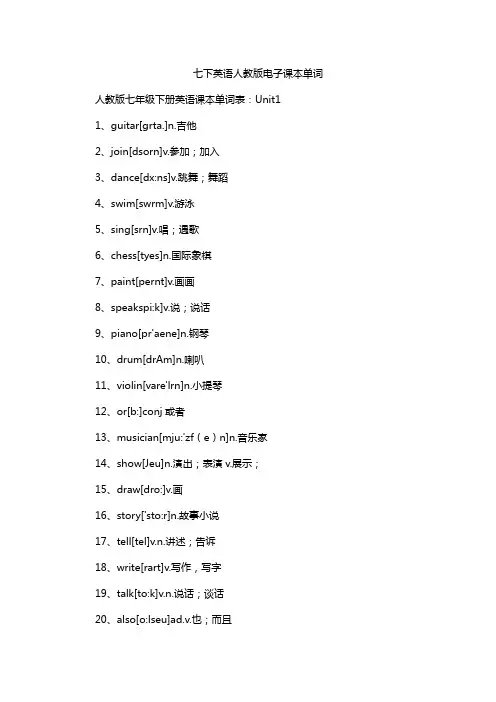
七下英语人教版电子课本单词人教版七年级下册英语课本单词表:Unit11、guitar[grta.]n.吉他2、join[dsorn]v.参加;加入3、dance[dx:ns]v.跳舞;舞蹈4、swim[swrm]v.游泳5、sing[srn]v.唱;遇歌6、chess[tyes]n.国际象棋7、paint[pernt]v.画画8、speakspi:k]v.说;说话9、piano[pr'aene]n.钢琴10、drum[drAm]n.喇叭11、violin[vare'lrn]n.小提琴12、or[b:]conj或者13、musician[mju:'zf(e)n]n.音乐家14、show[Jeu]n.演出;表演v.展示;15、draw[dro:]v.画16、story['sto:r]n.故事小说17、tell[tel]v.n.讲述;告诉18、write[rart]v.写作,写字19、talk[to:k]v.n.说话;谈话20、also[o:lseu]ad.v.也;而且21、people['pi:p(e)]n.人;人们22、center['sente]n(=cen.tre)中心,中央23、home[heum]n.家,活动本部。
ad.v..到家,在家24、today[te'der]ad.v.在今天25、make[merk]v.使或为;制造26、weekend.[wi:k'end]n.周末27、teach[ti:]v教,讲授人教版七年级下册英语课本单词表:Unit21、usually[jusueli]ad.v.通常2、up[Ap]ad.v.向上3、dressed[dresrd]adj.穿着衣服4、forty['fo:tr]n.um四十5、fifty[frftr]n.um五十6、never[neve]adv.从来;决不7、early['3:lr]adv.adj早的8、station['stef(e)n]n.电视台;车站9、funny[fan]adj.奇怪的;滑稽好笑的10、exercise['eksesarz]v.n.锻炼;练习11、group[gru:p]n.组群12、shower[Jave]n.v.淋浴;淋浴器(间)13、take a shower淋浴;洗澡14、o'clock(=of the clock)ad.v点钟(只用于正点)15、work[ws.k]n.&v.工作16、brush[brA]v.刷17、teeth[ti:e]n.(tooth的复数形式)牙齿18、job[dspb]n.工作;零工;任务;职位19、best[best]adj.&ad.v.(good,well的比较级)最好的(地)20、half[ha:f]一半,半数21、past[px:st]过去,往事22、quarter[kwo.te]n.一刻钟;四分之一23、homework[hecmws:k]n.家庭作业24、run[rAn]v.跑;奔25、walk[wo:k]行走;步行26、clean.[kli:n]v.打扫;弄干净;adj.干净的27、quickly['kwrklr]ad.v.很快的28、either['aroa]ad.v.或者;也29、lot[lot]pron.大量,许多30、taste[terst]v.有.….的味道;品尝n.味道;31、life[larf]n.生活,生存人教版七年级下册英语课本单词表:Unit31、train[trern]火车2、bus公交车3、subway['sAbwer]地铁4、ride[rard]v.骑n.旅rode.[revd]ridden.[rzdn.]5、bike[bark]自行车6、sixty['srks]六十7、seventy['sev(e)nt]七十8、eighty['er]八十9、ninety[narnt]九十10、hundred[hAndred]一百11、far[fx:]很12、minute[mznt]分钟13、kilometer['krle,mite]公里14、new[nju:]新的15、every['ev]每一个16、by[bar]通过,被17、drive[drar]开车18、live[Irv]活的,生动的19、stop[stop]停止20、cross[kros]交叉21、river[rrve]河,江22、many['men]许多23、village['vtlrd3]村庄,村民24、between[brtwi:n]介于.…之间25、bridge[brrd3]桥26、boat[bevt]小船27、ropeway[rop,we]n.索道空中缆索28、year[jre]n.年;年度;岁29、afraid[e'frerd]害怕;惧怕30、like[lark]像;怎么样(介词)31、leave[i:v]离开;left(lea ve的过去式)32、dream[dri:m]梦想;睡梦33、truel[tru:]真的;符合实际的人教版七年级下册英语课本单词表:Unit41、rule[ru:]规则;规章2、arrive[e'rarv]到达3、hallway[holwe]走廊;过道4、hall[ho.]大万礼堂5、listen[Irs(e)n]听;倾听6、fight[fart]打架战斗7、sorry['spr]抱歉的;难过的;惋惜的8、outside[avt'sard]ad.v.在外面adj.外面的9、wear[wee]穿;戴10、important[rm'po.t(e)nt]重要的11、bring[brn]带来;取来12、player['plere]播放机;运动员13、uniform[ju:nrfo:m]校服;制服14、quiet['kwaret]安静的15、out[at]外出16、dish[d]碟;盘dishes17、night[nart]晚上18、before[br'fo:]prep.conj在.…以前adv.以前19、dirty['d3.tr]脏的20、kitchen['krtjrn]厨房21、more[mo:]更多的22、noisy['npIz]吵闹的23、relax[rr'laeks]放松;休息24、read[ri:d]读;阅读25、terrible['terrb(e)]非常讨厌的;可怕的26、feel[fi:]感受;觉的27、strict[strrkt]严格的;严厉的28、remember[rr'membe]记住;记起29、follow['foleu]遵循;跟随30、luck[lAk]幸运;运气31、keep[ki:p]保持;保留32、hair[hea]头发;毛发33、learn[l3:n]学习;学会。
七年级下册英语原版人教版电子教材前言欢迎使用《七年级下册英语原版人教版电子教材》!本教材是根据我国教育部门的要求和人教版英语教材的内容,结合学生的实际情况,编写而成的。
旨在帮助学生更好地学习英语,提高英语水平。
目录1. Unit 1 Can you spell it?2. Unit 2 What's your favorite color?3. Unit 3 Do you like bananas?4. Unit 4 What time is it?5. Unit 5 Look at the monkeys!6. Unit 6 Do you like music?7. Unit 7 Let's go to the park!8. Unit 8 How was your weekend?9. Unit 9 What did you do yesterday?10. Unit 10 Where did you go on vacation?使用说明1. 本电子教材适用于七年级下册的学生。
2. 建议学生在老师的指导下,按照教材的顺序进行学习。
3. 学生在学习过程中,可以根据自己的实际情况,重复学习某些单元,以达到更好的学习效果。
4. 本教材包含了大量的图片、音频和视频资源,可以有效提升学生的学习兴趣。
5. 学生在学习过程中,如有问题,可以随时向老师或同学请教。
注意事项1. 本电子教材仅限于学习使用,未经允许,不得用于其他用途。
2. 请妥善保管好您的学习设备,避免教材内容的泄露。
3. 在学习过程中,请保持良好的学习习惯,按时完成学习任务。
祝您学习愉快!。
七年级下册人教版英语书笔记As I delve into the world of the seventh-grade English textbook published by the People's Education Press, I am constantly reminded of the vast expanse of knowledge and language skills that lie ahead. This book, with its diverse range of topics and engaging activities, provides an excellent platform for students to enhance their language proficiency while also fostering a deeper understanding of diverse cultures.**Unit 1: Can you play the guitar?** In this unit, students are introduced to a range of activities and hobbies, allowing them to explore their own interests and talents. The vocabulary and grammar structures focus on expressing abilities and asking for information. Key phrases such as "can you do something?" and "I can do something" are reinforced through various exercises, encouraging students to practice their speaking and listening skills.**Unit 2: What time do you go to school?** This unit focuses on daily routines and schedules, teaching students how to talk about their daily activities and the time theyspend on them. The lessons introduce new vocabulary related to time and activities, such as "get up," "go to bed," and "have breakfast." The emphasis is on using the present simple tense to describe routines, helping students build a solid foundation in grammar.**Unit 3: How do you get to school?** Transportation is the theme of Unit 3, where students learn about different modes of transport and how to describe their travel routines. The lessons cover vocabulary like "bus," "train," "bike," and "walk," along with the use of prepositions to describe locations. Students engage in activities that encourage them to think critically about their own travel choices and the environmental impact of each mode of transport.**Unit 4: Don't eat in class.** This unit focuses on school rules and regulations, teaching students how to express their opinions and talk about what they can and cannot do in school. The language skills emphasized include speaking and writing, as students are encouraged to write their own rules and justify their reasons for doing so. Thelessons also introduce modal verbs like "should" and "shouldn't" to discuss appropriate behavior.**Unit 5: Why do you like pandas?** Animals are the focus of Unit 5, where students learn about different animals and their habitats. The lessons introduce a wide range of vocabulary related to animals, including their names, characteristics, and habitats. Students engage in fun activities that encourage them to think about their favorite animals and why they like them. The unit also teaches about using adjectives to describe things.**Unit 6: I'm watching TV.** The final unit of the textbook, Unit 6, focuses on present continuous tense, teaching students how to describe what they are doing at a particular moment. The lessons introduce vocabulary related to activities and actions, such as "watch TV," "do homework," and "read a book." Students engage in practical exercises that help them apply their knowledge of the present continuous tense in real-life situations.As students progress through the book, they not only acquire new vocabulary and grammar structures but also develop their reading, writing, speaking, and listeningskills. The engaging activities and interesting topics keep students engaged and motivated, encouraging them to explore English language learning beyond the classroom.**七年级下册人教版英语书笔记探索**随着我深入探索由人民教育出版社出版的七年级下册英语书的世界,我不断提醒自己,前方有着广阔的知识和语言技能等待我去发掘。
学习必备欢迎下载人教版七年级下册英语书Unit1 Where’s your pen pal from 你的笔友来自哪里一、单词
pal n.好朋友伙伴、pen pal 笔友、Canada 加拿大、France 法国、Japan 日本、the United States 美国、Australia 澳洲澳大利亚、Singapore 新加坡、Paris 巴黎the United Kingdom 英国、country n. 国家、Sydney 悉尼、New York 纽约、Toronto 多伦多、Tokyo 东京、live v.居住、language n.语言、Japanese n.日语日本人、world n. 世界、French n.法国人法语、like n.pl.爱好、dislike v.讨厌不喜欢n.反感厌恶的对象二、短语1、be from come form:来自,从…… 来,是……人2、pen palpen friend:笔友3、live in Paris:住在巴黎4、speak English:讲英语5、speak a little French:说一点法语6、a little French:一些法语7、play sports:做体育运动8、like playing sports:喜欢做运动9、go to the movies:去看电影10、an action movie:一部动作片11、on weekends:在周末12、Excuse me:对不起,打扰13、get to:到达、抵达14、beginning of:在...开始的时候15、at the end of:在...结束的时候16、write to me soon:快点给我写信17、play sports:运动、锻炼18、speak a little French:讲一点法语19、like going to the movies with my friends:喜欢和我的朋友去看电影20、tell sb about...告诉某人关于...... tell sb. about yourself:告述某人关于你自己的情况21、an interesting country: 一个有趣的国家22、in November:在十一月23、her favorite language:她最喜欢的语言24、write 学习必备欢迎下载to sbwrite a letter to sb 给某人写信write to Tom:写信给汤姆25、Julie’s pen pal:朱利的笔友26、likes and dislikes: 好恶、爱憎27、the long weekend: 漫长的周末28、at school 在学校;在上学29、too difficult:太困难30、a very interesting country:一个非常有趣的国家国家国籍国人语言中国China 中国的Chinese 中国人Chinese 汉语Chinese英国the United Kingdom 英国的English 英国人Englishman 英语English日本Japan 日本的Japanese 日本人Japanese 日语Japanese加拿大Canada 加拿大的Canadian 加拿大人Canadian 英语、法语EnglishFrench美国the United States 美国的American 美国人American 英语English法国France 法国的French 法国人Frenchman 法语French澳大利亚Australia 澳大利亚的Australian 澳大利亚人Australian 英语English三、重点句型:(1)Where is your pen pal from He’s from China. 你的笔友来自哪里他来自中国。(2)Where does she live She lives in Tokyo. 他住在哪里?他住在东京。(3)What language does she speak She speaks Chinese. 她讲什么语言?她说汉语。(4)I think China is a very interesting country. 我认为中国是个很有趣的国家。(5)Does she speak English Yesshe does/Noshe dosen’t. 她会说英语吗是的她喜欢。/不她并不。(6)Is that your new pen pal Yeshe is /Nohe isn’t. 那是你的新笔友吗是的他是。/不他不是。(7)学习必备欢迎下载But I don’t like math. It’s too difficult 但是我不喜欢数学。太难了(8)What’s her favorite subject 她最喜欢的科目是什么?(9)What languages does he speak 他说哪(几)种语言?(10)Where is Sydney 悉尼在哪儿?(11)Does she have brothers or sisters 她有兄弟和姐妹吗?(12)I think 从句我觉得……;我认为……;我想……(13)What does he want 他想要什么?(14)What does he like 他喜欢什么?四、语法(1)Where 主be主语+from 主语+befrom地点.(2)Where do/does主语+live 主语+live/lives in…(3)What language do/does 主语speak 主语+speak/speaks….(4)主语+like/likesdoing… 1. Where is your pen pal from He is from Australia. 你的笔友来自哪里他来自澳大利亚。Where be主语from 用于提问“某人来自哪里?” 通常询问某人的籍贯。Where do/does主语come from重点:主语be from国名或地名主语come/comes from国名或地名Where does your aunt from She comes from Beijing. 你的阿姨是哪的人?她是北京人。2. Where does he live He lives in Shanghai . 他住在哪里?他住在上海。Where do/does 主语live 用于提问“某人住在哪里”通常询问某人的居住地。重点:主语live/lives in…如果地点是副词,则省去介词。Where do they live 他们住在哪里?They live here. 他们住在这里。3. What language does she speak She speaks Chinese. 她讲什么语言?她说汉语。What 学习必备欢迎下载language do/does主语speak 用于对所讲语言进行提问。What language do you speak I speak Chinese. What color is your sweater It’s black. What class is he in He is in Class Three. What subject do you like English. What time does your mother get up She gets up at six. What kind of movies do you like I like action movies. 4. I think China is a very interesting country. 我认为中国是个很有趣的国家。I think he is from Japan. 我认为他来自日本。I think… He isn’t from Japan. I don’t think he is from Japan. 5. But I don’t like math. It’s too difficult too 表示“太,过于”常用于修饰形容词,并位于它的前面。也用于句末,表示“也” Your favorite subject is math. Mine is math too. 你最喜欢的科目是数学,我的也是。too…to 固定短语,“太……而不能”表示否定意义。The boy is too young to go to school. 这个男孩太小了不能上学。The man is too old to run. 这个人太老了不能跑了。6. What’s her favorite subject 她最喜欢的科目是什么?What is one’s favorite名词?用于提问“某人最喜欢的……是什么”询问某人的爱好。—What is your favorite color - Black. —What is her favorite sports star –Yao Ming.五、重点单词和词组(1)country 国家,祖国,农村I love my country very much. 我非常爱我的祖国。My uncle lives in country. 我的叔叔住在农村。country life 田园生活country town 乡村小镇(2)live 居住He lives in 学习必备欢迎下载Toronto. 他居住在多伦多。live a … life 过着……的生活He lives a happy life 他快乐的生活着。live on sth. 以……为生,靠……生活Sheep live on grass. 羊以草为生。(3)language 语言Each of them can speak a foreign language. 他们每个人都会说一门外语。the spoken language 口语the written language 书面语first language 母语body language 肢体语言(4)world 世界I think he is the best runner in the world. 我认为他是世界上最优秀的赛跑选手。All the world knows it. 全世界的人都知道它。(5)pen pal 笔友pen friend I have a pen friend. She is an English girl. 我有一个笔友,她是一个英国女孩。(6)be from 从…… 来,是……人She is from Canada but she speaks Chinese very well. 她是加拿大人,但她汉语说得很好。come from 从…… 来,是……人Where are you from Where do you from Where is he from Where does he from(7)a little 修饰不可数名词,“ 一点,少量的”表示肯定的意义;little 则表示否定意义。There is a little water in the glass. 杯子里有一点水。I have little time. I must go now. 我剩余时间不多了,我必须走了。a few 修饰可数名词,“几个” 表示肯定的意义;few 则表示否定意义。I have a few pen pals. 我有几个笔友。I am new here I have few friends. 我是新来的,我没有几个朋友。(8)write to sb. 给某人写信write a letter to sb. Do you often write to your friends 你经常给你的